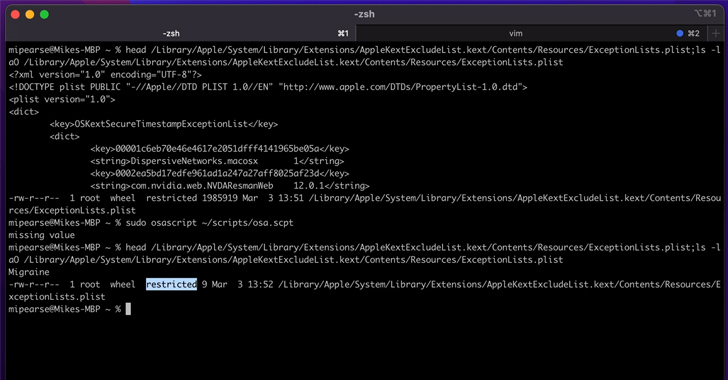Microsoft Details Critical Apple macOS Vulnerability Allowing SIP Protection Bypass
Microsoft has shared details of a now-patched flaw in Apple macOS that could be abused by threat actors with root access to bypass security enforcements and perform arbitrary actions on affected devices.
Specifically, the flaw – dubbed Migraine and tracked as CVE-2023-32369 – could be abused to get around a key security measure called System Integrity Protection (SIP), or “rootless,” which limits the actions the root user can perform on protected files and folders.
“The most straight-forward implication of a SIP bypass is that […] an attacker can create files that are protected by SIP and therefore undeletable by ordinary means,” Microsoft researchers Jonathan Bar Or, Michael Pearse, and Anurag Bohra said.
Even worse, it could be exploited to gain arbitrary kernel code execution and even access sensitive data by replacing databases that manage Transparency, Consent, and Control (TCC) policies.
The bypass is made possible by leveraging a built-in macOS tool called Migration Assistant to activate the migration process via an AppleScript that’s designed to ultimately launch an arbitrary payload.
This, in turn, stems from the fact that systemmigrationd – the daemon used to handle device transfer – comes with the com.apple.rootless.install.heritable entitlement, allowing all its child processes, including bash and perl, to bypass SIP checks.
As a result, a threat actor already with code execution capabilities as root could trigger systemmigrationd to run perl, which could then be used to run a malicious shell script as the migration process is underway.
Following responsible disclosure, the vulnerability was addressed by Apple as part of updates (macOS Ventura 13.4, macOS Monterey 12.6.6, and macOS Big Sur 11.7.7) shipped on May 18, 2023.
The iPhone maker described CVE-2023-32369 as a logic issue that could allow a malicious app to modify protected parts of the file system.
Migraine is the latest addition to the list of macOS security bypasses that have been documented under the names Shrootless (CVE-2021-30892, CVSS score: 5.5), powerdir (CVE-2021-30970, CVSS score: 5.5), and Achilles (CVE-2022-42821, CVSS score: 5.5).
Discover how Deception can detect advanced threats, stop lateral movement, and enhance your Zero Trust strategy. Join our insightful webinar!
Reserve Your Spot“The implications of arbitrary SIP bypasses are serious, as the potential for malware authors is significant,” the researchers said.
“Bypassing SIP could lead to serious consequences, such as increasing the potential for attackers and malware authors to successfully install rootkits, create persistent malware, and expand the attack surface for additional techniques and exploits.”
The findings come as Jamf Threat Labs disclosed details of a type confusion flaw in the macOS kernel that could be weaponized by a rogue app installed on the device to execute arbitrary code with kernel privileges.
Labeled ColdInvite (aka CVE-2023-27930), the flaw “can be exploited to leverage the co-processor in order to obtain read/write privileges to the kernel, allowing a bad actor to get closer to realizing their ultimate goal of fully compromising the device.”
A considerable amount of time and effort goes into maintaining this website, creating backend automation and creating new features and content for you to make actionable intelligence decisions. Everyone that supports the site helps enable new functionality.
If you like the site, please support us on “Patreon” or “Buy Me A Coffee” using the buttons below


To keep up to date follow us on the below channels.






![Cobalt Strike Beacon Detected - 154[.]204[.]35[.]215:80 7 Cobalt-Strike](https://www.redpacketsecurity.com/wp-content/uploads/2021/11/Cobalt-Strike-300x201.jpg)